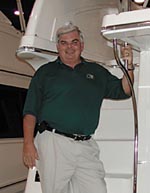 |
 |
You want to buy a boat, but not just any boat.
You want a really good deal on a late-model 38-foot trawler, and you want to be sure
it’s the best one available. Or, in order to buy your “new” late-model 38-foot trawler,
you’ve got to sell your “old” late-model 29-foot center console. What are you to do?
We’ve talked to several area brokers and come up with the following basics which may make you feel more comfortable about taking the next step.
The truth is that the vast majority of professional yacht brokers depend on high ethical standards to keep their customers happy and coming back year after year, sometimes decade after decade. And as for the commission, they earn it by helping you avoid potential problems, solving problems that arise in any used-boat transaction, and making the experience a smooth one.
 |
|
"Without our customers, we don't exist."
- Todd Juckett, Juckett & Russell |
Todd Juckett, who started his brokerage business with partner Stan Russell in April 1998, puts it plainly: “Without our customers, we don’t exist,” he says. “No customer, no business. We need them a lot more than they need us.” The brokerage house of Juckett & Russell is based in Edgewater, Maryland, south of Annapolis.
“You should choose a broker that someone you trust has done business with,” Todd advises, “someone who has good ethics. There are a lot of good and bad in all businesses. But someone who will do what they say they’ll do, that’s what matters. Look out for too many promises. Just check on them, call around to different brokers, look at the ads and see the rotation of the listings. If the product is changing every month, obviously, they’re selling stuff. If those boats are moving in and out of his ads, you can tell he’s doing a good job.”
Many brokers tend to specialize in sail or power, and sometimes in specific model lines. “I know the Sea Ray product because I sold those for years,” Todd explains. “I worked as the yard manager, mechanic’s helper, everything I could do to learn the business. My history with those boats makes it very easy for me to recommend a boat. This isn’t a job, it’s a passion.”
 |
|
"I have to figure out a way to make everybody happy."
- Nancy Cann, Crusader Yacht Sales |
Commissions help cover the costs of marketing the boat, from advertising in magazines and on the Internet as well as showing the boat to qualified buyers, Ms. Cann explains. She was the first woman president of the Yacht Architects and Brokers Association, an Annapolis-based national organization recently renamed the Yacht Brokers Association of America, and won that organization’s prestigious “Broker of the Year” award in 1996. “Because I have a contract that is recognized throughout the industry, everybody knows what the rules are going in and what the time frame is,” she explains, “and how to buy the boat or decline to buy the boat.” Brokers can help line up financing, insurance, titling, training, and other services.
Finding a qualified buyer is sometimes the easy part. “The hardest part of my job - and the most important part, too - is after we come to an agreement about the price,” Nancy explains. “Most deals fall apart there. You have to show the seller, who thought his boat was perfect, what’s wrong with it. I have to figure out a way to make everybody happy.”
 |
|
"A broker serves as a filter to weed out those people who are not prospects and bring in people who are really qualified.”
- Pat Mayben, Bristol Yacht Sales |
What a broker is supposed to do, Pat says, is “take all of those people who are suspects and pull out the people who are prospects. A broker should pre-qualify a buyer and then show the boat in the best light to those people who are ready and capable of buying the boat. The ‘for-sale-by-owner’ guy has to deal with all those folks, and they wear him out.”
 |
| “It’s difficult to acquire that experience if you haven’t been in the marine business for a long time. It’s the broker’s responsibility to know these things.” - Dave Harrison, Harrison Yacht Sales |
Dave Harrison recently came out of retirement to re-establish Harrison Yacht Sales at the Bay Bridge Marina on Kent Island, across the Chesapeake Bay Bridge from Annapolis. He sold his successful Sea Ray dealership in 1995, and is now back selling new Marlow Explorer pilothouse motoryachts and Selene trawlers as well as brokerage boats. His former experience with selling new Sea Rays as well as Carvers comes in handy now in his brokerage business.
“I personally know 80 percent of the dealers throughout the U.S. and Canada,” he explains. “I can find a specific model anywhere.” He frequently comes across boats on the used market that he sold himself as a new boat, and knows not only the original owner, but also where it was kept and how it was used. That’s the kind of experience that helps him steer a buyer to a good deal - or away from a bad one. “It’s difficult to acquire that experience if you haven’t been in the marine business for a long time. It’s the broker’s responsibility to know these things.”
Still, longevity is not the only mark of a good broker. Chuck Metzger and Bill Reinhardt are relative newcomers to the business, selling brokerage boats at Sassafras
 |
| "Keeping the deal together once it's going is the hardest part." - Chuck Metzger (left) and Bill Reinhardt, Sassafrass Harbor Marina |
Buyers these days are well informed, he finds. “When they come in, they’ve got a sheet from the Internet that shows them what that boat should cost if it’s in average condition.” But the book price doesn’t take into account the condition of a specific boat, which will be revealed by the surveyor, or other market factors, like a specific model’s popularity in a particular part of the Bay.
As Bill Reinhardt explains, “If you have a 38 Carver, which is in big demand on the upper Chesapeake, you can almost guarantee it will bring in 10 to 15 percent above the book value.” Bill has been boating for “close to 20 years,” he says. “Getting the customer to agree to purchase a boat isn’t a real tough part; keeping the deal together once it’s going is the hardest part. Basically, it’s giving the customer the knowledge he needs to make an educated decision.”
 |
| "Don't be afraid to say, 'Let me call a few of your customers and see what they think of you.'" - Walter McArdle, Shady Oaks Yacht Sales |
Shady Oaks has been in business for 20 years, and is rated as the nation’s top dealer for Silverton. It’s also among the top five dealerships for Tiara, and Walter himself was the year 2000 number one Carver salesman. “We sell three different new products and a whole range of used products,” he relates. “We can help obtain financing and we offer training on the boat — anything that’s necessary to make the buying experience fun. And we have all the facilities on site to provide any service that’s needed. One thing you should look for when you’re buying a new or used boat is references. Don’t be afraid to say, ‘Let me call a few of your customers and see what they think of you.’”
Overall, Walter says, “We sell fun. If we sell the customer a bunch of headaches, we haven’t done our job.”
Nancy Cann of Crusader Yachts agrees. “I’m proud of the fact that customers are well treated here. We all care about the customer. It’s supposed to be a happy time; it’s supposed to be fun, and we do everything in our power to make it that way. It’s a very positive thing we do.”